Life can be tough nowadays, but most of us are lucky enough to have never known true hardship: the type that our grandparents and great grandparents faced during the years of the Great Depression. But despite how hard life was back then, where there was a will, there was almost always a way.
So many people suffered extreme financial hardship during the Great Depression of the 1930s, and in turn that led to some pretty extreme frugality. The phrase “use it up, wear it out, make do or do without” was popularized during this era, and for good reason.
People had to get creative to make ends meet, and one of the ways they did this was by saving, reusing and repurposing absolutely everything. What we wouldn’t think twice about tossing today was as good as gold back then.
The most valuable items were, well, pretty much anything. But in general, the more uses you could get from a single item, the more valuable it was.
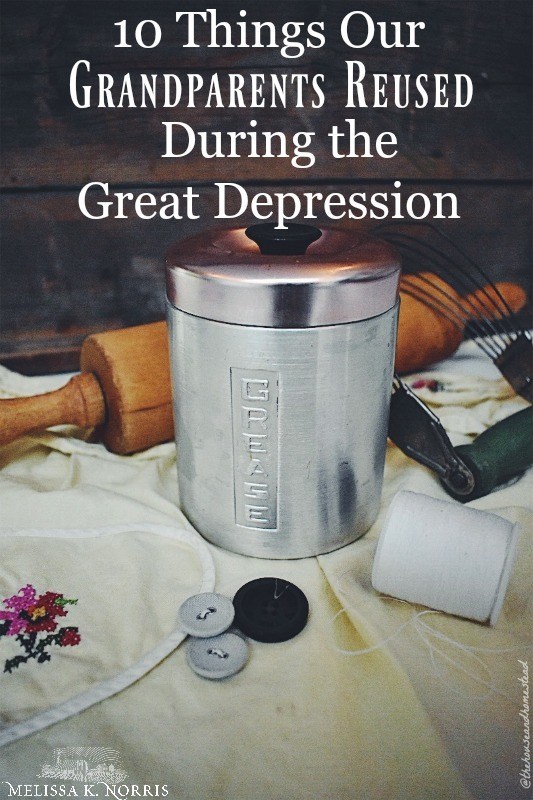
What did people reuse during the Great Depression?
Everything was reused, recycled and repurposed. Here are just a few of the many things people reused during the Great Depression:
- paper
- fabric scraps
- buttons
- string
- flour sacks
- tires
- soap
- kitchen scraps
We’ll go into all of these in more detail below, but suffice it to say that the more life you could squeeze out of each item, the more money you hopefully wouldn’t have to spend.
This period in history stayed with the people who were affected by it too. My great grandmother lived through the Great Depression and she saved everything her entire life: plastic, aluminum foil, twist ties, jars and containers… She was even known for rationing her toilet paper!
And she kept her savings in paint tins in the basement. Nobody trusted the banks after the crash of 1929 threw the country into an economic collapse, and understandably so.
Many folks did have their money in the bank, however, and when the stock market crashed they lost everything. Millionaires went broke overnight. And of course, the poor got poorer.
Without any money to depend on, people had to become very resourceful. Finding creative ways to reuse and repurpose everyday items became a life skill that sometimes even meant the difference between life and death, and could even be exchanged as a currency in the trade and barter system that emerged when money all but ceased to exist for many people.
So what exactly did people save, and how exactly did they repurpose the scraps that could no longer be used? The list is extensive. Pretty much anything that people got their hands on was put to good use over and over again. But there are a few common items that many people saved, and many innovative ways they were used. Here are 10 common items people reused during the Great Depression:
10 Things People Reused During the Great Depression
1. Old clothing, sheets and towels
Clothing was worn until it was down to the bare threads. The same went for linens and towels. Then, if there was fabric that could be salvaged, it was repurposed into new clothes or linens or washcloths or rags. Rags were then used as-is or they were patched together to make new clothes or linens or turned into rag rugs. Socks were also saved and repaired. Everybody darned their socks back then, which is difficult today because most socks are made out of synthetic material and don’t hold the stitch.
2. Flour bags
Flour and grain sacks were also very versatile during the Depression. They were made of cotton and some even had nice prints and patterns on them, which made excellent fabric to make new clothes out of. The “flour sack dress” was popular during the 1930s, but the fabric was used to make everything from dresses, shirts and pants to linens, patches, aprons and even underwear and diapers.
3. Tires
The rubber from tires was used in a variety of different ways. It could be used to patch soles on worn-out shoes, scraps could be used in home garden beds, and it could be used as a construction material in the “Hooverville” shanty towns that popped up when people began losing their homes. (They were called “Hoovervilles” after President Hoover who was in power at the time, and the ramshackle shelters in these olden day tent cities were pieced together with whatever scraps people could find, including cardboard, tires and even newspaper). In desperate situations, tires were also be used as fuel and burned to keep warm, despite the incredibly hazardous black smoke that’s emitted from burning rubber.
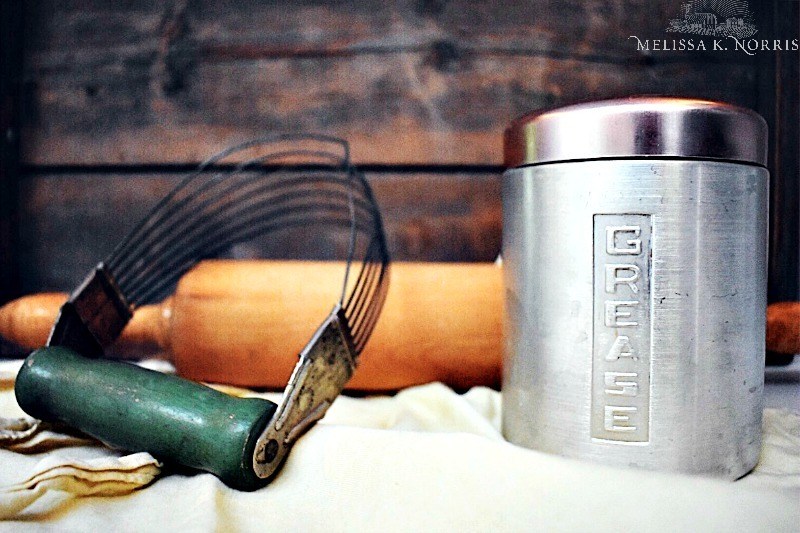
4. Jars and containers
We modern homesteaders joke about the amount of Mason jars we keep on our shelves and in our basements and, generally, in every nook and cranny of our house. I know I can personally say that we reuse Mason jars for every conceivable purpose around our house! So it’s no surprise that glass jars and tins and containers of all sorts were never thrown out or discarded during the Depression.
Jars could be used to store food, collect kitchen grease or hold any number of household items from buttons to rubber bands. Tin cookie tins were often repurposed as lunch boxes for children and for lucky men who still had jobs (albeit with meagre wages), and for those out pounding the pavement trying to find one.
5. Soap and candles
Everything was used to the very last drop, and that included things like soap and candles. Odds and ends were saved from bar soaps and wax candles and were collected and remelted to make new candles and new soap. And every last drop of liquid soap was used up and diluted with water to last longer. This was an effective way to stretch a buck that is still popular with some people today.
6. String and elastic bands
Every piece of string and elastic band was saved (in one of those repurposed jars) in case it was needed in place of new thread to mend clothes or to stitch or tie any number of things together. Likewise, rubber bands were hoarded and used to repair items, hold things together and to make the popular rubber-band guns, a children’s toy made from a clothespin, a piece of wood and a rubber band which kids would shoot at each other when playing games.
7. Buttons
In a day and age when clothing was handmade even without the economic collapse, buttons may as well have been gold coins. Every extra button was saved and used to mend old clothing that was missing buttons and to add to newly sewn items. They could also be used as game pieces and Bingo markers (a game that also became popular during the 1930s and was also known as “Beano” because participants often used beans as markers for their Bingo cards.
8. Paper & Magazines
Every scrap of paper and paper product was saved during the Depression. Cardboard and magazines and stacks of newspapers were even used as building materials in pop-up shantytowns! My mother has even told me stories that my great grandmother told her about using magazines and newsprint as toilet paper in the outhouse during those times (perhaps this explains her toilet paper rationing later in life).
Paper bags were also saved. Scraps were used as writing paper and parcel-wrapping paper and were even turned into little hand-sewn notebooks that could be gifted to children at Christmas time. Another story I read was of a woman whose mother saved magazines and paper scraps and made papier mâché, which she then used to make picture frames! Talk about resourcefulness. If nothing else, paper could always be burned for fuel or to start fires, which was a much better option than tire fires.
9. Kitchen Scraps
Of all the places in the house, the kitchen was the last place that saw anything go to waste. Everything was reused in the kitchen. Every eggshell, chicken bone, end of stale bread and jar of lard or grease was put to good use in some way. Likewise, parts of animals that we don’t normally use or eat nowadays were put to good use: Chicken feet were turned into soup, innards and gizzards were gobbled up and feathers were used to make pillows and bedding.
10. Water
Water was also a commodity (probably the most important one of all) that many people didn’t have access to during the Great Depression. In cities, people couldn’t afford to pay their water bills, which meant their water was shut off. Or worse, they couldn’t afford to keep their homes, so they ended up in a shanty town without water.
But water was never more scarce than it was for people in the drought-ridden dustbowl areas of the U.S. where all the wells were dried up. Any water that could be reused was. Multiple people bathed in the same water and then cleaned their clothes and their dishes in it too. The old saying “don’t throw the baby out with the bathwater” would have definitely applied during this time.
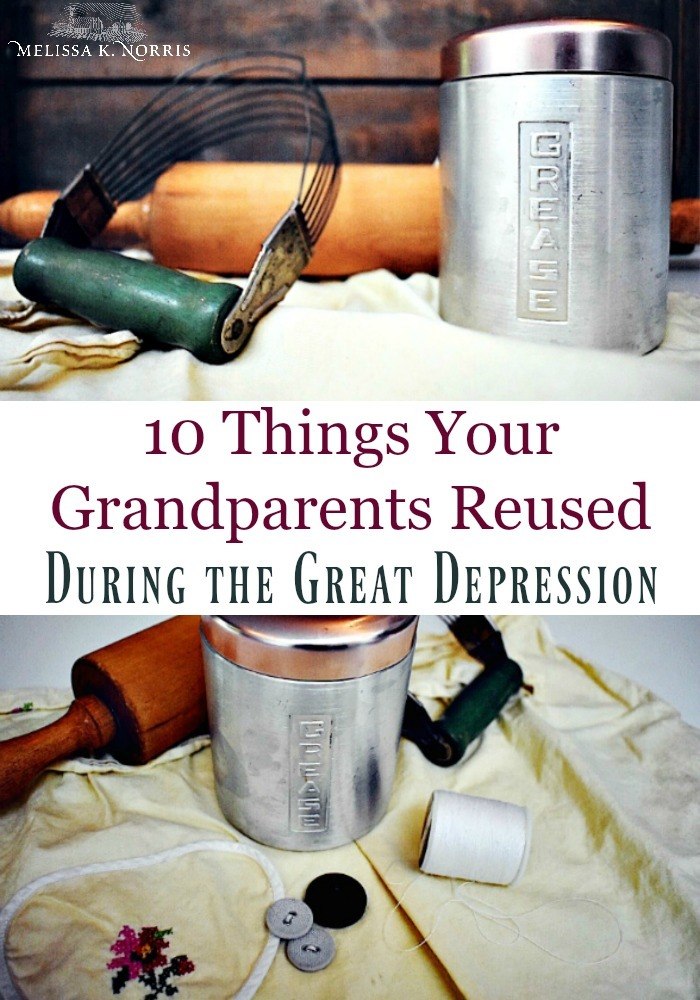
Subscribe to Melissa K. Norris!
Get updates on the latest posts and more from Melissa K. Norris straight to your inbox.
We use your personal data for interest-based advertising, as outlined in our Privacy Notice.
What can we learn from the Great Depression?
Today we live in a throwaway, consumer society where we produce more waste and waste more money than ever before, money we often don’t even have to begin with. People living through the Depression would be been horrified at the amount we throw away nowadays!
Now, I’m not saying you should hang onto everything that comes through your door. In fact, I hate hanging onto anything that I don’t use. Clutter is a huge source of anxiety for me and I love only having a few useful items and creature comforts around me if I can. But I also believe in living frugally, within our means and preparing for whatever the future may hold, because you never know what tomorrow will bring.
Nobody knows this better than those men and women who lived through the Great Depression. The lessons of that time have stuck with many of them for their entire lives. In some cases, the lessons have been passed down through generations. But we’re beginning to forget, and when we forget the lessons we learned in the past, history is doomed to repeat itself.
Luckily, as modern-day homesteaders, we generally still live by the most important rules of the Great Depression: Use it up, wear it out, make do or do without. And always be grateful for every little thing.
What do you reuse or repurpose in your house? What frugal rules or habits do you live by? Leave a comment below and let me know!
More Articles on the Great Depression
- 17 Self-Sufficiency Tips from the 1940’s & Great Depression Live Interview
- Creating a No-Waste Kitchen w/ Mary’s Nest
- Handmade Gift Bags & Tags from the Great Depression Era
- 5 Life Lessons from the Great-Depression
- Great Depression Era Money Saving Tips w/ Potatoes
- 7 Depression Era Tips to Stretch Your Food Budget
- 8 Depression Era Tips to Save Money Now
- Building a Great Depression Era Pantry
- 6 Things Our Great-Grandparents Did Better Than Us
- How to Stay Cool in the Summer Naturally & Old Fashioned Tips
- How to Keep Your House Cool in the Summer without Electricity
- Surviving Winter Without Power & Great Depression Christmas Traditions
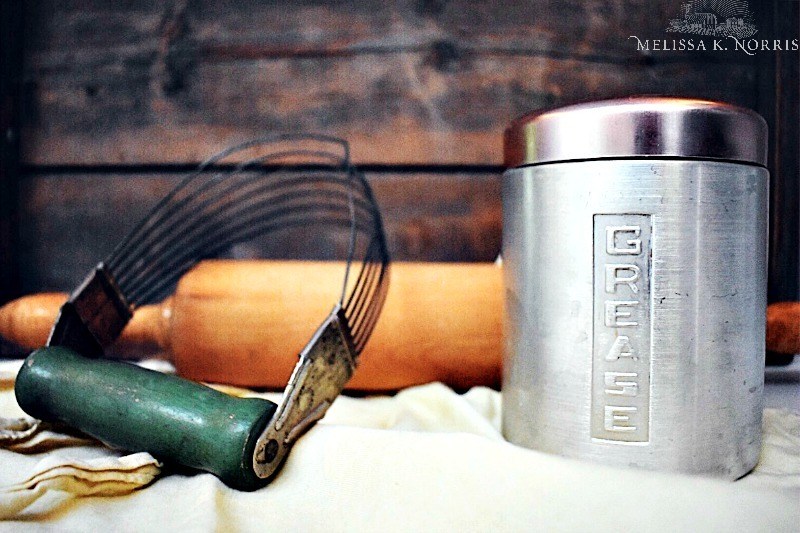
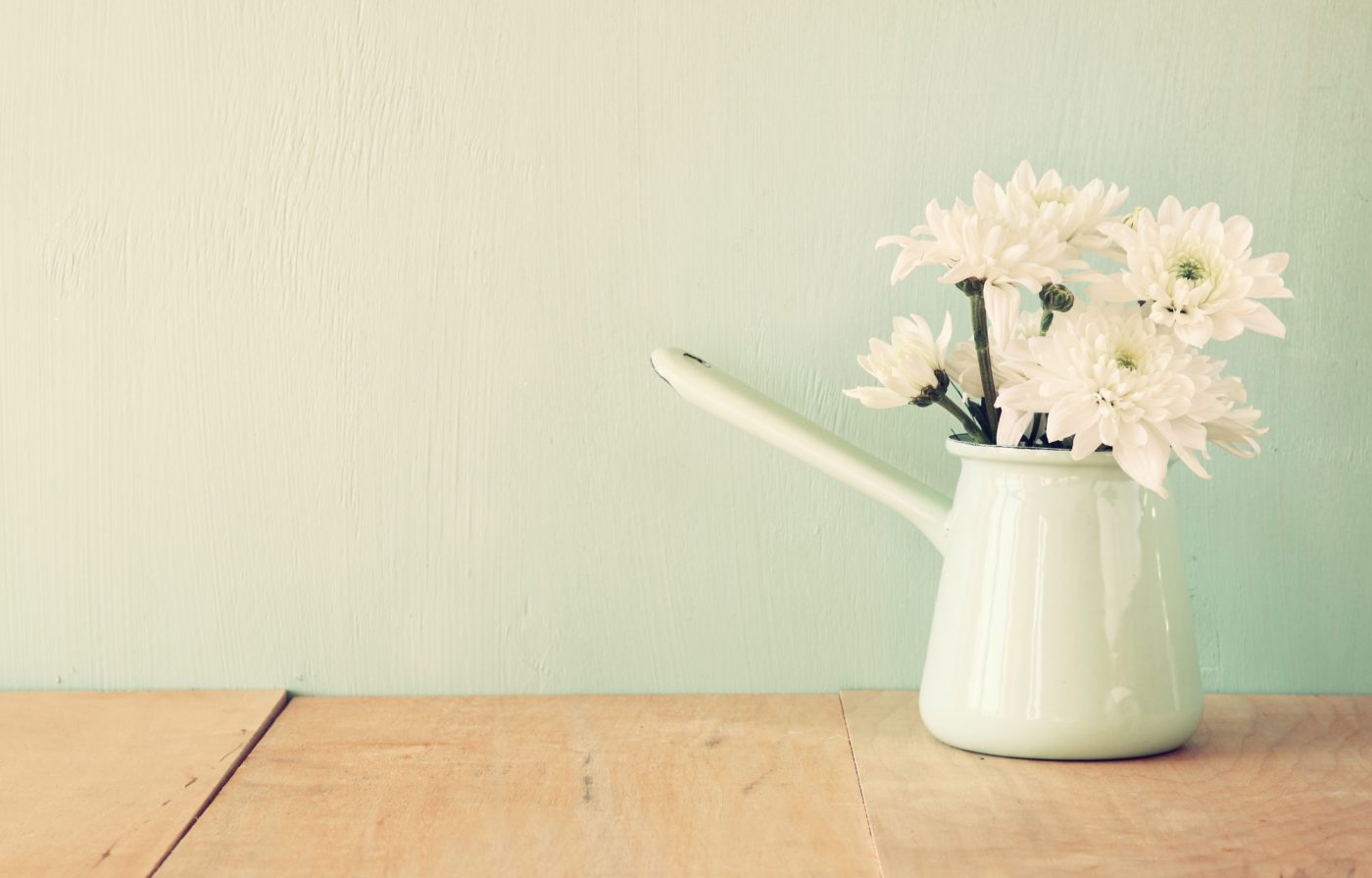
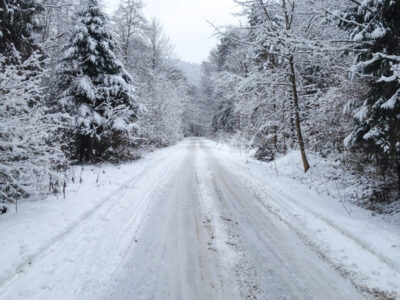
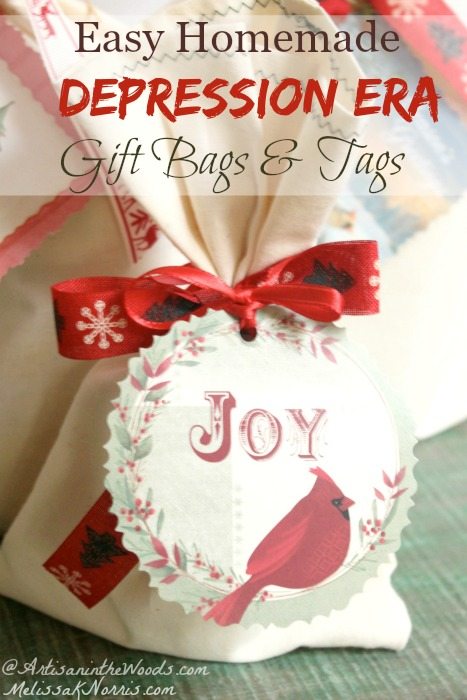
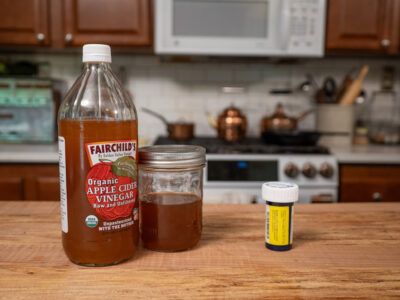
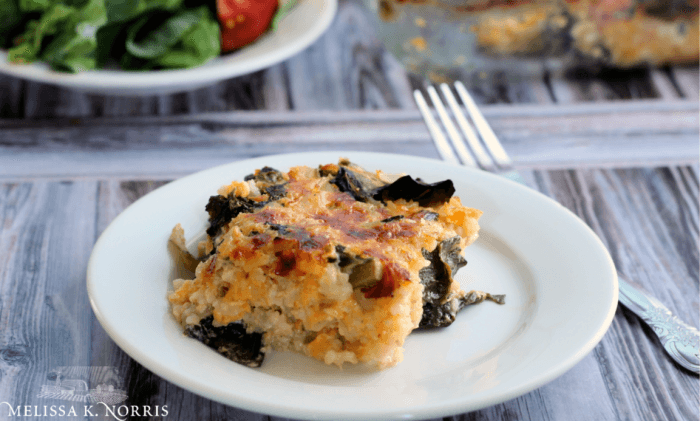
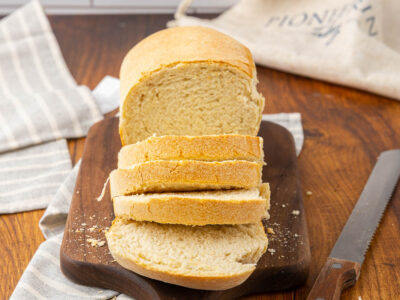
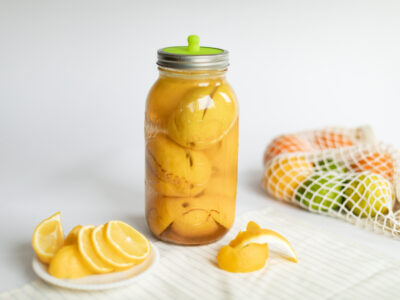
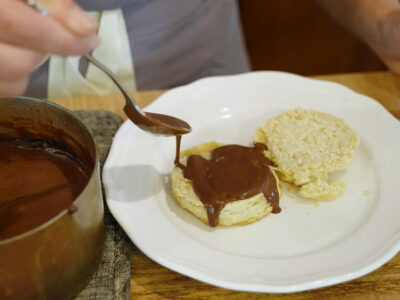


My grandmother lived on a farm during the depression. She said many times that what got her the most during those times was people who were dirty. She said you could have thread bare clothes, but they should be clean. The thing I saw her hoard because of the depression was sheets. When she died we found a closet full of sheets still in the package. She really didn’t talk much about her up bringing because she ended up being the one responsible for her sibilings at a very young age during a very bad time. Just every once in a while she would mention something, but the dirty was what I remember the most. They made lye soap on the farm. I thought maybe it was because I heard from others that they only took baths on Saturdays. That would get me, for sure.
I really enjoyed your article. I currently do 99% of all the things you listed here and more , that I learn from my mom and grandma and great grandma there’s a lot to learn from the way they lived back then. I think the way our world is heading right now; that we’re heading to a recession for sure, but also a depression and I think there’s gonna be a rude awakening for a lot of people. Good luck and God bless all who read your article.
hubs has been getting ice cream in the tubs, was trying to figure out what to do with them since they arent real thick plastic, but nice handle and lid….well, separated my canning lids/rings by size – putting in tub; using to hold my dishwasher pacs; anyone got some other ideas? as I said, they arent thick plastic, so wont take heavy stuff, but hate to throw away!!!!
Like all postings before mine, I save mostly the same items. Preparing for the very possible collapse now. I’ve repurposed the ribs from old patio umbrellas for garden poles, took apart a useless microwave, keep all screws, washers, etc., used the metal box to make a solar oven, took the satellite dish not longer used, lined it with ten foil to reflect sun light, used the glass plate in the microwave for the top of the new solar oven, sprayed the inside with flat black paint. Will it work?, time will tell, if not I’ll go to the cardboard box method. Always thinking outside the box. Great to know so many with the knowledge of the old ways or least aware. So many are totally unaware and don’t know our countries history or even care therefore, history will repeat itself. When will we ever learn? What will you do if our power grid goes down, not if but when, CME, EMP or cyber attack, 9 major power stations sabotaged all the grid goes down, God help us then. Prepare for the worst, pray for the best. Knowledge and skills are life. Blessings to all. Gooood day!
Thank you for these great tips. We live in such a throw-away society; it’s sad. My parents did not grow up during the Great Depression but did grow up in large families in a third world country. I have learned much from them.
I’m feeling somehow, the idea of the Great Depression ending globaly at once is a bit of a farfetched view. Shouldn’t we be recycling everything at this point?
I’d be interested in how you’re making the bricks for the woodburner.
My mom just passed away we miss her dearly she would wash jars and save them wash baggies save them and of course the plastic bags from stores to use in the small trash cans there’s so much that can be reused but gets trashed ?
I spent alot of time with my maternal grandpaerents when I was young. Grandmother saved jars for canning. Saved dried beans and peas for the next years crops. Tin pie pans were used in the garden to keep the crows out. Cereal boxes were cut up and reused along with newspapers. Tea bags were often reused. Rubber bands, paper sacks, and string were saved and reused. I could go on and on. They were amazing frugal people that I was always so proud of!
I am constantly looking online for articles that can aid me. Thx!
poooooooooooooooooooooooooooooooooooooooooooooooooooooooooooooooooooooop thats whats i think of the recipie
My grandmother didn’t have the tool to cut in butter or lard for her biscuits. She used two knives. She saved her bacon drippings and used them to season her food she cooked. I still do. There’s nothing like it in beans and such. I do love the “old” ways.
I grew up with a Grandmother who was the mother of three during the depression in bone dry Kansas. Even through we lived in Southern California with access to city water, we saved water. Ran dish water in a pan, take pan out, water a bush, God forbid if you brushed your teeth with water running, Turn IT Off! Water to her was as precious as gold when every bucket came in from a walk to the well in freezing cold. Today, in drought plagued North Texas, I keep a five gallon bucket in the shower, while the water heats up, it goes in the bucket, and out to a tree. Try to time showering so unnecessary running of water, don’t run it while washing dishes or teeth brushing. Amazing how much water we waste, by not planIng grass and garden watering, too.
My father nailed tops of baby food jars to a wooden board. Then he sorted his nails, screws, and other tiny objects in the glass bottles and screwed them into the lids. He could find whatever he needed at a glance.
In our house, we were taught to turn out the lights when you left the room and push the toothpaste from the bottom of the tube. My Mother saved string and used the back of used envelopes for note paper.
I do pretty much all of these. I don’t darn socks, but use them as rags. I save soap, reuse candle ends, keep chickens, so all food and garden scraps go to them, repurpose clothes if they aren’t good enough to donate. I probably have more scrap paper than I’ll ever need for taking notes or writing shopping lists! The hardest one is water use. While I usually pour cooking water onto my plants,it’s not easy in the suburbs to bucket out bath/shower water, although we have done that too.
Like most people I copied my mum with a variety of re-use habits. The buttons were taken off clothing and saved for using again. Old adult shirts were adapted and used in the class room as protective covers during art/home economics. Paper is folded still at home as firefighters. Old towels/clothes as dusters/cloths. Here in Crete everyone who has access to olive oil tins use them in their garden as planters. I repurposed my friends wedding dress to make a first communion dress for her granddaughter.
Enjoy your e-mails, they are a great inspiration & encouragement. I reuse towels, soap & plastic/glass containers. Scrap out my lotion bottles and food containers. I try very hard not to wast anything.
Thank you
God Bless Bonnie
Enjoy your e-mails, they are a great inspiration & encouragement. I reuse towels, soap & plastic/glass containers. Scrap out my lotion bottles and food containers. I try very hard not to wast anything.
Thank you
God Bless Bonnie
I have reused ziploc bags. I wash them with the dishes and use a drier that stands on the kitchen counter when in use then folds to put in a drawer when not in use. They last at least 6 to eight times.
I was raised by parents of the Great Depression. My parents taught me to be independent and have the ability to substain myself and family, I have practiced this my entire life. I taught my children how to do the same. Thank God for “ old time raising “
This might not seem like much but I like to refill my liquid hand soap dispensers with fragrant (but cheap) body washes or shampoos. Buy the big bottles when on sale. Some of the store brands smell terrific and cost a lot less than small bottles of name brands
What a great idea!
My mom got married during the Depression. She said there were times they only had oatmeal to eat and they were happy to get that.
I was the youngest child, and I grew up in the 50’s. Relatives said I was spoiled, and by their standards I might have been, but I learned a lot from my parents on how to be frugal and yet to be giving.
As a child, when playing with paper dolls did anyone use an ordering catalog to cut out clothes for their paper dolls? I used to do that because it made play different. It was like shopping for clothes.
Comic books were cheap, but I could only buy one once in a great while. However, I would go to Rexall and very carefully read some of the comic books. I guess the owner tolerated me because I didn’t smudge or in any way ruin the comic books.
My aunt used to preach to my mom…she should be reading better books than comic books! And my mom would reply…but she is reading and that’s what’s important.
My mom didn’t sew quilts but she saved scraps for patching and if she had time, she’d make some doll clothes for my dolls on her Singer treadle sewing machine. Later on, I’d make my own doll clothes, but not as good as she could and she didn’t have a pattern. I still have a few of those doll clothes she made and they are special because she made them from pieces left over of the clothes she would sew for herself and for me.
When my husband and I lived on the farm, we didn’t have a lot of outbuildings, only the necessary ones. But, he did have a special rock pile. The rocks helped to preserve most items in that the rocks kept the metal off the ground to prevent rusting, so if he’d need something there was a good chance he could find it on the rock pile.
During those years on the farm, we needed wash cloths and hand towels but we couldn’t afford them at the time. At garage sales I found terry cloth robes sometimes for less than a dollar. I’d cut them to size, zig zagged the edges to make wash cloths and hand towels.
I have reused household items my whole life. My grandmother always said she didn’t know there was a depression as they were so poor already, saving, bartering and reusing was a way of life for them. They lived in south Louisiana, my grandfather was a trapper and my grandmother picked crabs at a factory for 3 cents a pound. That was just a way of life for them, never having anything and she reused everything until she died in 1997. I reuse all the time and never even think about it, I’ve tried to teach my daughter to do the same and I know she does as time allows with her busy schedule. One of my favorite things to reuse is newspaper, it has so many uses but the one I swear by is to clean glass and mirrors. It’s the absolute best!!! Vinegar and water sprayed on and just clean with newspaper, amazing!
I am guilty of all of the above, LOL! My grandmother saved all the Christmas and birthday wrapping paper and ribbons. I save all the gift bags nowadays, and don’t wrap many gifts, and don’t save the paper, LOL!
The fine line is between ‘saving’ and ‘hoarding’. And that is so personal. I do a ‘purge’ a couple times a year. If it hasn’t been used or worn in the past six months, it goes. One in, one out. Just wish I could get DH in the same mindset…
I try to make all sauces and combo spice like fajita seasoning,and BBQ SAUCE. All our meals are from scratch. I have been under the weather for a year but getting back in the swing of things and taking over the cooking. I used to can when I lived in CT but now live in Fla and the veg here are terrible!! I’m not sure where all my equipment is and can’t use my flattop stov e? Any ideas?veg scraps make broth. While chickens make 2 main meals and 2 lunches then the bones make broth u can freeze for future use with NO CHEMICALS in it when I use pasture raised meat.
I have used my flattop stove to can on for years. Up until a few years ago I was still using my grandmother’s canning kettle. If I could find a way to repair the chipped enameI I would still use it. I do still use her canning jars. She was born in 1896.
I don’t remember my grandparents ever wasting anything.
I try to make all sauces and combo spice like fajita seasoning,and BBQ SAUCE. All our meals are from scratch. I have been under the weather for a year but getting back in the swing of things and taking over the cooking. I used to can when I lived in CT but now live in Fla and the veg here are terrible!! I’m not sure where all my equipment is and can’t use my flattop stov e? Any ideas?
I could write a lot but I’ll leave you with just this one idea. When I use public restrooms or anywhere paper towels are used for drying hands, I save mine. I keep them in a bag in the kitchen and some in the BR to use for dirty cleaning such as spills, grease,wiping a skillet before washing, any place you would use a paper towel to clean. Some can be rinsed and used again then when spent they go into the compost. I do the same with napkins plus a take unused napkins from dinners, banquets, restaurants (if they are left on the table they get thrown) I never buy paper towels or napkins.
When I plan our meals for the week, I make sure that ingredients I need to purchase will be used up later in the week in other meals. For example, I purchased a bag of spinach to top
our homemade pizza, and I am using the rest in a chicken cauliflower rice soup, and veggie curry. The pork tenderloin leftovers will be used in slow cooker pork ramen. Yum, it is also a way to try new recipies.??
This article reminded me of a few things I experienced as a child. My grandparents went through the depression, as did my parents as very young children. My paternal grandmother gave me an apron she made from a flour sack when I was about 6 years old. I still cherish it. She also had a saying about buttons. If we were particularly “good,” she’d say she was going to give you a button. Buttons were fun for me as a child. I made zizzers from the large ones and sewed smaller ones onto my doll clothes. My family wasn’t one of the poorest…my parents worked in the furniture factories and had weekly paychecks that covered the necessities. But, we did not waste anything nor throw anything away that could be repurposed. I follow that to a degree still. Containers are my favorite reusables. Glass and plastic are my choice. You’ll find them in my pantry, my refrigerator, my sewing room, wherever a container is needed for storage of small items or dry goods. I also grow and can my vegetables and keep a small flock of chickens. How much better off people would be if they returned to a simpler lifestyle and were thankful for what they have rather than constantly wanting more.
My parents lived through the depression. My grandmother sewed dresses from flour bags with prints on them and would give them to my mother and aunts. I still remember her wearing them. They also lasted a long time.
My parents were older, born in the early 1900’s….so they lived through the Depression and the Wars….and I was heavily imprinted by their habits and attitudes. To this day I like being prepared for the unexpected and even meet with a prepper group to learn skills, information and share sources for supplies that are good to have on hand. Growing up on a farm, we saved our used extra water to water houseplants or fruit trees out in the yard. We would catch rainwater from the roof to use for watering plants and sometimes watering animals if they ran short. Even today, I save certain juice and milk bottles that would make good containers for carrying water while hiking. Because I live along a busy highway, I anticipate at some point in the future (due to lack of electricity) that people might stop by for food and water as they try to go someplace and I’ll be ready with water in a container they can take with them. I save plastic and paper grocery bags for re-use and cardboard boxes for shipping and packing. I remember when I was a little girl, my Father would bring big cardboard boxes home so we could cut windows and doors to make playhouses or schools so we could play teacher….I always loved doing that. I also collect a wide variety of books because when people do not have TV, cell phones, computers, and other technology available to fill their time, folks are going to be going stark raving mad…and I will be able to hand out books for people to read or educate themselves on topics of interest and possible service. I think it is very wise to recycle, repurpose, and plan ahead to deal with any unexpected event, whether a natural catastrophe or human-caused.
I’m a product of first generation immigrants from the Cayman Islands to the USA. That being said, my parents were born in 1922 and 1923, not making the move to the States until 1954. Back then when they were growing up on Island, most of the niceitys were imported from England (and you know how long that took) my Grandmother made soap with wood ash and of course washed clothes for her 11 children on a washboard. Electricity wasn’t available until 1968, water was collected in a cister n from the thatched roofs of their homes. So you know I have been blessed with survivial skills beyond measure. I was taught, waste not want not. And am so grateful to have been given those lessons. My biggest reuseable item these days are containers, glass bottles & jars. I rarely use paper products in the kitchen. My big splurge is Member’s Mark toilet paper.
Learning frugality is easiest, I suppose, when it is a choice as opposed to a necessity. Get good at it when the stakes are not so high! Great article, Melissa.
I asked both of my grandma’s how the Depression affected them. Both pretty much said it didn’t, because they already didn’t have much money. My Dad’s parents lost their farm on the CO prairie with the Dust Bowl and moved back to her home in the mountains, Basalt. There they did everything needed to survive until my Grandma finally got the job as Postmaster and that saved them financially. My Mom’s parents were in Denver and also lived in mining towns where my Grandpa panned for gold. He finally got a job at the foundry in Denver and their lives stabilized. Both sets of grandparents came from hardscrabble families.
And yes, they saved everything. It always got a second or third or fourth use. This was strong in my parents and now in me. I have my own collection of buttons, sour cream containers, and lots of various jars!
As with everything, this has the bright side of learning to live within your means, being frugal with what you have. The dark side is that it can develop a poverty mindset. That there is never going to be enough. And I have seen this, especially in my Dad. He saves everything and will spend an hour looking for a 59 cent part. I am working on this anxiety and fear in myself.
Am I going to stop saving jars and buttons? Nah, but I might throw out that Ziploc bag!
my mother sewed most of our clothes and I remember her button box…I had so much fun looking at those beautiful buttons…wish I still had her buttons…
She also took mens pants and cut them in long pieces and made braided rugs…. braided rugs probably started that way…using up what one had.
My mother learned to sew repurposing clothes left by boarders. Her mother was a widow with 2 children under 5 when her husband died.
I save mail envelopes for list paper. Tear fabric to make ties for my veggies. Pantyhose make stretchy soft ties foR tomatoes. I remember flat sheets ripped down the centre and sides sewn to extend the life of the fabric.(took these to university)
We use the ashes from our wood fires that burn down to a fine powder and mix them with compost or soil to add nutrients back into our vegetable and flower gardens.
My grandparents lived through the Depression and my parents were children during that time. My Dad’s family, in particular, was hard hit, as they lived in Oklahoma during that time. My grandma talked about those times and was someone who saved every little thing. I save jars, string (although not as much as my Grandma did!), fabric scraps, etc. I also cut old t-shirts into “yarn” for rugs or hot pads. I have a huge collection of old blue jeans, which I use for many things. Every piece of clothing that is too far gone to wear or donate gets cut into rags or fabric scraps and all buttons and some zippers are saved. We repurpose scrap metal (my husband makes yard art!) and we have a garden where we grow our own vegetables, herbs and flowers for our use and for many in our community.
My dad grew up in the great depression era. He has often said they were lucky to have the clothes that were covering their body because there were no others at all. There was no food and he even drank sour milk.
At 97yo, he is in his last days as I type. While going through his possessions and household stuff I have found everything he has ever owned. Every sock with plenty holes doubled with another holey sock. Every shoe with soles broken cracked or missing. Elastic pulled off waistbands to reuse. Every pair of old underwear. He never threw away anything like old lawn mowers. I was absolutely shocked and stunned at the shoes and work boots. I just couldn’t believe he had kept all these clothings, footwear, work items, telephones, stoves, suit, homemade bed mattress, etc. The used and worn appearance left me speechless.
I look at these and think they need to be in a museum or someplace to show the impact of the Great Depression on people like my dad. CAN YOU OR SOMEONE PROVIDE IDEAS OR SUGGESTIONS? Or should they just be trashed? [email protected]
KC,
Maybe you could contact the local historical society? Also, or instead, stage some photographs (or find a pro to fo it) and create a visual record. It’s an important part of your family history.
Dear KC,
My dad was the same. My dad had much loss in his life, and he dealt with it by saving everything. Your dad went without so much, so he saved everything. There are so many treasures, but still a need to edit. My dad had some things that used to belong to his grandfather, my great-grandfather, during the Civil War! That of course, I saved. I kept for myself his WWII Navy trunk, and selected treasures from different parts of his life, so that my children and those after, will have a sense of who he was. The rest either got used, given to someone who could use it, sent to Good Will, or recycled or even trashed if it was beyond all value.
I save many things from my own life, both for history and for future use, but I know it is important to know when to stop, too, for mental health, for ease of cleaning and finding things, and also so that my children don’t have a burden when I get older.
I’m so sorry for your loss. It is clear he was special and dear. I’m glad that you have had a chance to learn more about his life through the things that he kept.
It’s funny you should write on this today. I spent the weekend decluttering my bedroom where I had a stack of old sheets, blankets, towels and rugs. Instead of throwing them away, I am using them for pet bedding. I have barn kitties and I use old towels and blankets for them in the winter. I downsized from a 2200 square foot house to 1000 square feet and I just have to go box by box and decide what I love. I have oodles of old vintage linens that have been passed down. I love changing them out season to season.
I try to do most of the things mentioned here as well as a few others. When my boys were growing up and my husband was home every night (he drives a truck now) we had very few leftovers. I had a large covered bowl that I kept them ALL in. It didn’t matter what it was it went in the bowl, pieces of meat were chopped up and thrown in, veggies juice and all, pasta, rice, everything. When the bowl was full we had “Leftover Soup” as we called it. It was never the same but it was always good.
I got an icing bucket from my local grocery store, put hooks on the sides facing down, and save my plastic grocery bags for trash bags. I have one of these small trash cans in each room including the kitchen. Taking out the trash is easy as it isn’t heavy and usually doesn’t leak. If it leaks i just carry can and all to the outside can then rinse out the little one. Easy peasy.
We had way to many t-shirts! I took all of our old not-so-nice ones and made bags out of them. I cut out the collar and sleeves, sewed the bottom together and hemmed the cut parts. Instant grocery bags. I do still use the plastic ones for meats and when I need more trash bags. I just can’t see paying good money for cheap store bags then giving or throwing away shirts. I then cut the sleeves open and use them as rags. Not much left of the collars but I’m still thinking on that.
I also use feed bags for trash bags. They are great for large jobs and best of all, they’re already trash, why not full them before tossing them? And they are free.
It’s amazing how resourceful people were during the depression, refusing to waste anything. We could take a lesson from them because today’s society is so incredibly wasteful.I try to reuse items as much as possible, but I know I have some room for improvement, but this has inspired me to do better.
I do nearly all these things. We don’t believe in waste and reuse as much as possible. Part of it is our belief not to waste, and part of it necessity as our money is very tight. We wear clothes until they’re unrepairable/look ugly because they have holes. We save buttons, mostly because Mom and Grandma saved them and it just is something women do and it is nice to have a jar of buttons 🙂 I reuse aluminum foil because it is very expensive – I only use Reynolds wrap because the cheaper foils are very thin and tear with first use. We don’t save magazines for toilet paper ? but we do save newspapers because we reuse the paper. We reuse nearly every plastic bag that comes into our home, including bread bags and ziplocks.
I never wanted to reuse to save money when I was younger. I thought of it all as clutter, and I was working and could just rebuy. But I’ve really changed my thinking and our way of living over the years. It really is a better way, both for the environment and our pockets!
Hello:
I am living the dream of homesteading in the big city of Toronto, Ontario Canada. It is amazing how much I do as reuse, reduce recycle (from the ways they had to live in the Depression era). I try and help my friends to have a well stocked pantry, I show them how to reduce, reuse, recycle. it brings joy to my heart to help others learn what I do. I learned from my Mother and Father. We were very poor and my Dad was the one who worked. My Mom stayed home with me. In the city where everyone had modern things, we had a wood stove to cook from and to heat our home. I can’t tell you how many times we got smoked out in the middle of the winter either because the wood was green or something else. I am not complaining at all for the way in which we had to survive.
This is where and how I learned to survive and it has helped me greatly in life. And still does to this day. So I try and share the things I do.
Things that I do too:
– save fabric scraps
– save buttons
-save string/twine, ribbons,twine, lace, rubber bands I ask the mailman to
please give me some. I collect twist ties which I use for keeping all
wires off the floor. Jars and containers I also save them. They do come in handy.
I just bought the book by Melissa Norris Hand Made. I cannot put it down. Keep up the good work. God Bless Debbie
Hello:
I am living the dream of homesteading in the big city of Toronto, Ontario Canada. It is amazing how much I do as reuse, reduce recycle (from the ways they had to live in the Depression era). I try and help my friends to have a well stocked pantry, I show them how to reduce, reuse, recycle. it brings joy to my heart to help others learn what I do. I learned from my Mother and Father. We were very poor and my Dad was the one who worked. My Mom stayed home with me. In the city where everyone had modern things, we had a wood stove to cook from and to heat our home. I can’t tell you how many times we got smoked out in the middle of the winter either because the wood was green or something else. I am not complaining at all for the way in which we had to survive.
This is where and how I learned to survive and it has helped me greatly in life. And still does to this day. So I try and share the things I do.
Things that I do too:
– save fabric scraps
– save buttons
-save string/twine, ribbons,twine, lace, rubber bands I ask the mailman to
please give me some. I collect twist ties which I use for keeping all
wires off the floor. Jars and containers I also save them. They do come in handy.
I just bought the book by Melissa Norris Hand Made. I cannot put it down. Keep up the good work. God Bless Debbie
Hello! What a nice article! This brought back a lot of wonderful memories! I lived with my grandparent’s when I was a baby through age 6. Mom worked and lived 20 miles away from them, didn’t trust anyone but them, best upbringing ever! We used to pluck chickens for supper, Gramps fished 3 days a week and that put a lot of food on the table, that and his lovely veggie garden! Gramma made bread once a week as 2 of my uncles were still at home. Homemade everything, pies, breads, potato chips, chicken mash, liniments, dressings for cuts, candy, butter, syrup, buttermilk. She cooked with lard and bacon grease and they lived to be in their 90s. Gramps even rolled his own smokes. I remember once Gramma was making a baby quilt for a couple’s newborn and ran out of fabric, she snipped a piece right off from her apron, I was shocked. She said, “if it’ll keep a baby warm at night, I’d sew my whole apron to it.” Boy, I miss those two! Nice read, keep em coming!
I do my best to reuse as much as I can, one thing I’ve found though is that many things aren’t made to last anymore. We use rags instead of paper towel, I save all my bacon grease for cooking, wash out ziploc bags and reuse till they are broken, I save the inside of cereal boxes and put my homemade bread in them instead of buying new bags. We still live by the motto of use what you have or go without.
Hi,
One of the frugal things I do is make my own dog food. I save veggie scraps, use it in a crock pot with a whole chicken.
I then debone the chicken, and cook the bones in the broth until the bones are soft enough to mash.
I add the marrow in with the meat.
Then I use the broth to make oatmeal.
I add the meat, marrow ,oatmeal in with green beans, carrots and maybe some sweet potatoes or pumpkin.
I eyeball the mixture, about 1/3 of each.
Meat, grains and vegetables.
I usually yield about 20 pounds, which I freeze in small containers.
My dogs love their food and they are super healthy.
My vet says I can’t buy any dog food that would be healthier.
It’s a lot more affordable to!
Thanks for the great recipe!
I my parents and grandparents went through the Depression and it not only stayed with them, but passed on to us. I don’t know about my older sisters, but I have always kept a “rag bag” for worn out cottons, sheets and towels. I have used these mostly for scrub rags, polish rags, coffee and tea strainers, swifter mop covers and recently have begun using them for day pads, since I’m long ago to old to need menstral equipment. I buy cotton socks, shirts and tee shirts and under ware, because they are warmer than synthetics, and when worn out, they have a second life from my “rag bag”. My grandfather used to use all our cast offs. Grammy and PaPa would cut them in strips, Grammy would sew together like colors, wind them into balls and PaPa would select the colors to make into beautiful and useful rugs. They made soap together, they did wash together, cleaned up and washed dishes together, they canned together, he gardened and she cooked and baked. And both worked full time. Needless to say, they were my ideal of what marriage should be. And in Grammys diary on their fortieth anniversary she wrote “Forty years, and still pals.” Now that was a marriage!
I can do one better than 40 years: My parents met when they were around 10. They married when they were about 20, and dad just passed away a couple of years ago at age 84, so 74 years together and they were still in love.
There are not many things that go to waste in our home especially in the kitchen. Food scraps are saved in freezer for soup stock, then composted. Some are fed to chickens or directly composted. Plastic bags, tin foil and parchment are reused until no longer reusable then recycled. Rubber bands, bread ties and clips, jars of all kinds and sizes have many uses as storage throughout the home and workshop. Old clothes can be refashioned, but a better use may be to a local homeless shelter or donate to Goodwill, St Vincent de Paul, etc (both have donation programs for the homeless). We don’t bring something in unless something goes out. There are always those so much less fortunate than we are, what we don’t/can’t use there are free websites or places to offer it. Finally, there are things that must go to the garbage but that can be limited if they are not brought into the home in the first place. The most difficult thing about reusing in our household is that we have to draw a line on how much do we hold onto for that someday we can use this for something.
I reuse paper that is written on one side. I write on it or use it to photocopy. I always save the buttons from garments I no longer use. I save twist ties to reuse. I wash plastic zip bags. I use non-recyclable containers for grease & put it in the garbage when full. I reuse some cardboard to make templates. As long as it isn’t dirty I reuse aluminum foil. When I have toast I rinse off my plate so I can use it again. Eggshells, peelings, etc. are saved and given to the chickens. I make tote bags with web handles from feed and seed bags. I have cloth napkins we use multiple times until they need washing. I save small boxes to use as gift boxes. I make homemade bread, desserts, soups, etc. And of course there’s more but that’s enough.
My parents lived during the great depression. When we cleaned out the house that they had lived in as did my Grandparents and Greatgrandmother I know that they saved everything that could be possibly used again! They attics were stuffed. I remember as a girl seeing the flour and sugar bags laid out on the grass so the sun would bleach the writing,so they could be used for aprons, dresser scarves and pillow cases. I had a wonderful childhood but I am glad for Thrift stores so I can donate things I no longer need.
My parents lived during the great depression. When we cleaned out the house that they had lived in as did my Grandparents and Greatgrandmother I know that they saved everything that could be possibly used again! They attics were stuffed. I remember as a girl seeing the flour and sugar bags laid out on the grass so the sun would bleach the writing,so they could be used for aprons, dresser scarves and pillow cases. I had a wonderful childhood but I am glad for Thrift stores so I can donate things I no longer need.
I I was fortunate enough to learn Depression era lessons from my mother and grandmother. I have mason jars filled with vintage buttons which I use to change the really ugly modern buttons on “new” (to me) clothing. My grandmother and mother made all of my school clothes until I was in junior high school, when I learned to sew myself in Home Ec class. I keep, and reuse mason jars and jam jars to keep my office supplies tidy. I generally shop at thrift stores…let someone else pay full price! When clothes become threadbare, I tear them into strips and make braided twine, which I then use to make rag rugs and decorative baskets. I also mend old quilts with fabric scraps, and still darn socks which I knit myself. I can patch jeans with the best of them and still save bacon grease in a coffee can for reuse. I will always be grateful to my grandmother for teaching me so many valuable lessons which continue to help me to live frugally.
I would also be interested in the shredded paper/wood brick information! Thank you!
I’d be interested in how you’re making the bricks for the woodburner.
In the early 70s, my grandmother had an outhouse and yes, we used magazines and newspapers for toilet paper.
My other grandmother would take junk mail and repurpose it. Envelopes would be cut open and she would use the inside of the envelopes as scrap paper for making grocery lists or to-do lists. If there was any unprinted places in the junk mail letters, she would also cut these into scraps for notes.
Hahaha… my mom explained to me why Sears & Roebuck was so popular. The free catalog (it was almost 2 inches thick if you are old enough to remember) became their outhouse toilet paper for the year. Mom said, “You crumple it, and uncrumple it, crumple it, and uncrumple it, trying to get it soft!” Thank you for reminding me of what she said.
Great article, and the comments are even more interesting and informative! My grandparents were raised during the Depression, and many lessons learned from them have helped me through some rough patches. Having a well stocked pantry has been the biggest. Neither of my grandmothers canned, but their pantries were always full. So even in lean times, we had something to eat. When times were tough, rather than ask my parents for money, I would ask them to grocery shop for us. I do save some ‘oddball’ things, like rubberbands, twist ties, nails and screws, etc. I don’t ‘save’ buttons per se, but do have a small collection on hand (I am not the greatest at sewing, although my mother made all my clothes until I was school age–guess that gene passed me by LOL). Gardening was another gift I learned from my grandparents and parents. I could probably go on. Suffice it to say, I am grateful that my grandparents gifted me with some of their knowledge and habits.
A couple of days ago CNN and MSNBC carried an article that Russia and China have hacked our national electric grid and left devices to shut-down the entire complex. You and your family may be far better suited to survive than most.
I was raised on a ranch where I had to rise early and start the fires in the kitchen (my Grams cooked on a huge wood-burning monster stove), the bathroom and the living room fireplace. I had to milk 2 cows every morning and evening and tend to the chickens and livestock (rough in the winter) Your article reminded me of those days. Thanks.
Use up every bit in any bottles, tubes etc.. There is still a lot in the bottom.
I read the article and the reader comments, which are on point. Great information.
I am still using the flour sack pillowcases from my grandmother, and have quilts on our beds made from pieces of clothing – we used to say – oh that was mother’s Sunday dress, or that was my school shirt last year. Sorry to say can’t often say that about clothes in our closets, much less on our beds.
i still have my mom’s button box and the sock darning tool(which was my job in the 50’s) she passed 3 yrs ago at 98. when we moved her to be with us 10 yrs ago, i had to empty her house of all the stuff she still saved-
You didn’t mention hand-me-downs. My parents both lived through the Great Depression & they remembered every last miserable minute of it for the rest of their lives. My dad grew up on a dry land farm. He said that they practiced the 3 Ps of dryland farming: Plow, Plant & Pray… Because his family lived on a farm, they were more fortunate than many others. Being the baby of the family, my dad never got anything new until he outgrew his two older brothers clothing & shoes. He was 16 years old before he ever owned a new pair of shoes. His family grew sugarcane, corn & hogs as cash crops. They used draft animals to do the plowing. (mules) They had a large vegetable garden & grew most of their own food. The only staples they ever bought was flour, sugar, yeast, salt & a few other incidentals. They only got new clothes & shoes at hog slaughtering time. I suppose that was one of the few times they had any spending cash. And yes, they saved everything… My dad had a compulsion to save jars & tins for some reason. It used to drive my mom nuts. Now I wish I had all those jars that he had stashed away. Most products are now packaged in plastic. I find myself looking at items that are considered disposable & trying to think of a way to reuse them. I wish I had half the resourcefulness that my parents & grandparents had.
I forgot to mention another reality of the Great Depression… Farming the kids out… My dad’s parents farmed their 5 kids out to other local farmers during the harvest season for 5-25 cents per day, per kid. That means that they earned 25 cents to $1.25 per day from their kids labor. It was a princely sum for those days & times. The farmers always paid the money to the parents, not the kids. They harvested crops such as cotton, peanuts, sugarcane & corn by hand. My dad said that harvesting peanuts was actually much worse than picking cotton because you had to walk between the rows bent over to pull the low growing plants, slap the plant against your leg & drop it on the ground to cure in the sun. They pulled peanuts from two rows at a time, on the right & left. So you were pulling plants with both hands while slowly walking down between rows. He said it was backbreaking labor in the hot sun. That was how many families survived during the Great Depression.
ALSO: gave my husband his “high & tight” haircut for 24 years. And cut my kids hair until they went to college.
I was an Army wife to a career soldier of 24 years. When I was a very young 20 yo enlisted soldier’s wife, they had enlisted wives meetings; where they taught us how to be good Army wives. The fastest thing I learned was, when our husbands were deployed or away at training, our separate rations pay was taken out of his pay to feed him during his time away. I was taught how to stock a pantry, make a small garden, canning & freezing skills; because we wives still had to feed ourselves & children while they were away helping for freedom. I learned “having 2 is 1, and 1 is none.” I also bought my first sewing machine for $99 and a hand crank to save on electricity; and taught myself to alter curtains (very handy as we moved 15 times in 24 years), sew clothes for the kids & myself, make repairs (sewing new zippers, promotion stripes,etc). I also learned how to use “pants stretchers” to starch wet uniforms in the Oklahoma heat (they would dry on the line in 20 minutes) and to press them like the dry cleaners. I also bought a Learn to knit book, and taught myself to make baby blankets, kids hats, slippers, etc. for gifts, & for living in upstate cold NY. I bought all my great mix-matched knitting needles & crochet hooks at estate & house sales. Another wife taught us how to make easter baskets for our kids; another’s mom (who had a ceramic shop)while visiting, taught us how to paint ornaments; we learned from each other, while keeping us busy & keeping our kids together with play dates (older kids, watched younger kids).
I was so fortune to have those precious people in my life, and we all learned how to live through so difficult times; but those are some of my fondest, most cherished memories!!
I truly continue to use all these skills today!
Update: during Desert Shield/Storm Reservist spouses complained when the Army took their Separate Rations Money, so the military enacted Iminent Danger Pay of $150, so they would have some food money. We Old Time spouses, just shook our heads, and reministiced about the Enlisted Wives Meetings we use to have when we were very young, the great people we met and learned from.
I found this article very interesting. My grandparents lived during the depression and many of their ways of doing things have passed down to me. My mother tells me that since they didn’t have wax paper, my grandmother would wrap sandwiches in a damp tea towel to keep them fresh while she took them to the field for my grandfather. If you have girls who like to read, I highly recommend the American Girl Kit series. They are a fascinating look at a depression era family and how they “use it up, make do, or do without.”
This article resonates with me as I was raised by my dad who was born in the depression. My grandparents also had a huge impact on my life. They didn’t waste much of anything. My dad worked hard to care for my sister and I (our mom abandoned us), and even when he went to work for a good company making good money, he still felt broke.
I got married very young and we were dead broke. This was in the 70’s during the recession where good paying jobs were scarce. I like to say I went through my own Depression as we were so very poor at the time. We subsisted on $63 a week and I finally had to apply for food stamps when our son came along as we could barely afford to eat.
I grew up darning socks and still do. I wear cotton (white) sports socks, and these are very easy to darn. I always wear out the big toe and a hole starts there. I used to darn my kids’ socks and some of them still do so also.
I always saved (and still do!) buttons off of clothes that are just too warn out to be of good. I have a button tin. My grandma saved buttons also. Back in the 1990’s when some of my girls were small, fancy socks were all the rage at $6.00 per pair. No way was I paying that. I bought nice socks (6 pair for $6.00), went to the craft store (Jo-Ann Fabrics) and bought some lace, then I sewed the lace on the socks and added some cute buttons I had saved like heart-shaped, flowers, etc. The lace was cheap as I bought it by the yard (and would have used a 40% off coupon). I also bought some small craft bows and sewed them on some of the socks. My kids now had fancy socks like other girls and they cost me pennies to make each one.
I save pieces of soap scraps in a jar as this can be made into another bar of soap. I save bacon grease for frying and cooking. I save all my sour cream cartons (we do not eat cottage cheese) and these are used for summer when my green peppers, jalapeno peppers come ripe as I dice them up and freeze them in these containers. I do put a piece of plastic over the top before I put on the lid as this helps keep the green pepper smell from cross-contaminating my other foods (no one wants butter that has been frozen used for cookies with the taste of green pepper in it!). I also often freeze extra onions from our garden before they can sprout or go bad, these go into freezer bags usually. Sour cream containers can also be used to send home leftovers with kids/grandkids. The one year we had green, purple, yellow, red and orange sweet peppers. I marked the top of the sour cream lids with a P, Y, R, O or J (jalapeno) and left the green ones blank. I knew at a glance which peppers were in each.
I save jars of all kinds-jam jars, small pimento jars (2 and 4 oz), baby food (at least I still have some, not sure baby food comes in jars anymore), spaghetti sauce jars, and any other fancy or useful jar.
As spaghetti jars have gotten smaller, I can no longer can in them (one brand actually used canning jars that could be re-purposed). Bacon grease goes in these, as does other grease I may not want to save like hamburger grease. I’ve used them to put in dehydrated foods, rice, beans, and noodles (back when they were quart-sized). I make my own body butters, lotions, sugar scrubs, often giving some as gifts and these pretty jars I save make the perfect size and look nice as gifts. Earache oil (homemade) goes into a small 2 oz. pimento jar and then in the fridge so it lasts longer. Small amounts of raw honey and other items can easily be sent home with kids or grandkids and I won’t miss the containers.
Back in the 70’s and 80’s when margarine came in sturdy bowls, we saved them for use as cereal and soup bowls for the kids. I could not afford butter at the time and did not know about the health dangers of margarine. I stopped buying margarine in 1992 and we’ve used butter ever since.
My great aunt who is 92 years old said when she was a young girl that her mom used old rags torn up for menstrual periods as they didn’t have pads, and if they were out, they couldn’t afford them.
I do not have a string ball, but another great aunt used to have one. My grandma also had one. All extra pieces of string got added to this ball. I save rubber bands (the large kinds that come in packages), bread ties, and anything useful. I have baby jars full of tacks, push pins, paper clips, and small odds and ends.
I buy many things from yard sales and thrift stores. I found a lovely, heavy blanket last year for $3.00 at a yard sale. It looks almost new. I did not need it, but gave it to a grandchild who did.
I buy everything on sale, use coupons for everything I can (including when we eat out) and look for close out sales. I have a Sears card and use it for everything, paying it off at the end if the month, and make about $1000 in cash rewards (goes on my rewards card) from this card. They pay me to use their card! Last year after Christmas I bought a tree skirt that had originally been $39.99 marked down to $15.99 and I had $10 in rewards points and so I paid $5.99 for it. It is a very nice skirt.
My husband and I are no longer broke. He makes very good money, the kids are all grown, and we can afford many things, but I still try to be a good steward of our money and we have a nice nest egg we are saving for retirement. I rarely where jewelry, but I had my eye on a very pretty heart-shaped necklace with (unpolished) an emerald in it. It sold for $99.99, which was a ridiculous price. Then it went on sale for $49.99 before Christmas- but still too high. Last week it was on sale for $17.99, I had a $5.00 off coupon and got it for $12.99! Just the right price!
I know in my head how much something is worth for me. Back in the 1990’s I fell in love with a jacket, but it cost $79.99 and it was not worth that! I waited a few weeks (probably 6) and finally got it for $27.99! I had decided it was worth $25.00, and $28 was close enough. I NEVER buy anything full price! Even though my husband makes 6 figures now, I still live frugally.
I wish you were a neighbor, Lori. I could learn a lot from you! 🙂
I find it interesting and sad that due to no fault of their own, people were put out of their homes because they couldn’t make the loan payment. I have always felt the banks acted in greed and lacked basic compassion for evicting people whom they mishandled their money to begin with. If anything, the banks owed it to these people to let them live in their homes during this time. It was a disservice and abuse of their power. I blame also the companies that shut off the water/heat, etc. that added to the hardship brought on by these entities. I realize they needed to make money to stay in business, but I still think more could have been done (people work in exchange for electricity for example). I read the book “A Square Meal” based on the depression and food problems, politics, greed, dishonesty, etc that went on. It was an eye opener and disgusting at the same time. I do not put trust in the government to help during another depression. We will all need to fend for ourselves. Doing things now is great practice and will make it easier to transistion later. Of course this is just my opinion.
Marla,
It has become normal to blame the banker. During the Great Depression, many local bankers went under and bankrupted themselves, as they did everything possible in an attempt to save their communities, farmers, ranchers, and the homeowners too. It was not greed. Students are no longer taught economics and most people do not understand how our financial system works, so we blame the banker. It is easy. While the last decade should have taught us, things can go very wrong and yes no person should have purchased a bundle of terrible mortgages and thought they’d get rich. That was greed. However, on the flip side of this equation, there are millions of Americans living in homes they can not afford, right now today. Our country is littered with mini-mansions and the clock is ticking as to how long the Average American can hold on this false economy. It is not the banker’s fault when people strive to live above their means.
You may not realize that Depression was caused by the Federal Reserve and the laws passed by govt. that made a small depression worse. Hoover’s attempts to fix the problem caused a big mess and when FDR came along, his people doubled down on the bad ideas. We are still living with the idea that the government can just pass a law and that will fix any problem. How to fix the situation? Elect all the politicians that say they will cut the regulations and then make sure they actually do that. Also, reject any that say they will give you a free any thing, they only want to make you more of a slave. When you steal from your fellow citizen, you are a criminal…but when you elect politicians to do the same thing!?!
I was told by an Oklahoma family that if a family had been frugal enough or resourceful enough to not be among the first wave of evictions, that they were allowed to stay in their homes because the banks got to a point where they just couldn’t handle anymore housing/land inventory.
My dad is 91 and I love to talk to him about his growing up days. One thing he’s mentioned is the town he grew up in brought in a pastor from another state because that pastor was single, raised goats, and gardened so he was self sufficient and they didn’t need to pay him much. In fact, many of the congregation payed their tithes in chickens, eggs, slabs of pork etc. This must have been better than money for the pastor!
I grew up with the depression ways still greatly used. Ham bone and white bean soup was almost a weekly meal. We darned socks or reused them to dust. Every little jar was saved to hold buttons, camping items, leftovers, etc. I still use canning jars to freeze food or keep it shelf stored (keeps mice and ants out) and I drink from a quart jar(duel purpose; it helps me keep track of my consumption). “Waste not, want not” was my mom’s motto. Her father went from job to job and died when she was 9 years old so much of the depression she was raised by a single mother. Both of my parents learned much during those difficult times,and passed that information down. I’m so thankful they did.
My grandparents, who lived in a farm hours from a city or town, paid tithes that way, too. After they processed something, they would divvy it up. They calculated 10% that went to the local church which would either distribute to a family in need or keep it. The remainder stayed in the house.
Food NEVER goes to waste around here. If we can’t eat it our animals can or we can bury it in our garden and by chance if there’s anything left and usually there isn’t, we compost it for our garden. I honestly cannot remember the last time I actually just threw something over the hill. What I have a hard time repurposing are cottage cheese and sour cream containers, butter boxes and papers. Milk jugs I refill with water and save or put them in the freezer or use them to cover small plants. I do the best I can but you can only re-use so much – but I’m trying!! I saved an old ice cream bucket and put my soap odds and ends in it and make little soap balls from them and people think I’ve spent big money for them! LOL!! We don’t use paper towels or napkins here either. I hadn’t thought about leftover candles but now I know I can do that too! Nice article. Thank you. My grandpa and grandma used to complain how much people take for granted. They’ve passed now and I wish I could tell them they were so right!
Nina,
I had that same issue. I have been saving them, and i drilled holes the bottoms and use them for my seedlings until they are ready to go into the earth.
My mom was young when the Great Depression happened. Luckily they lived out in the country where they raised a lot of things as well as being able to hunt and fish on the land. I think a lot of the Depression rubbed off on my mom as I remember her saving a lot of things you mentioned. One of them being buttons. She would take them off of clothing before reusing or discarding the material. I have her sewing machine and in the drawers are many jars of buttons. Also she would save and reuse butter containers, cottage cheese container, etc and use them for bowls or for leftovers. I learned from her and saved many things as well growing up and into adulthood. I don’t do that much anymore, but I do save a few things….bones, vegetable scraps, orange peels, ziplock bags, etc.
Rose, we could have the same mother! Ha! Not only did my mom take the bottoms off clothing, but shoe strings off shoes. She learned to sew, and became an excellent seamstress making everything we wore, curtains, bedspreads, even learned how to cover furniture and car upholstery. She canned, froze, and cooked from scratch. I’m not nearly as many faceted as she was, but I’m pretty well versed thanks to my upbringing.
Paper towels! We have designated “rags” at our house. Instead of using 2 or 3 paper towels and throwing them away, we grab a rag, wipe up the spill and toss it in the laundry basket to be washed in the bleach load to sanitize. We’re very frugal at our house!
I also dont use paper towels. I buy at thrift stores as they are amazingly cheap there. For dishes i buy packs of utility wash rags to clean dishes with. I also use the sanitary cycle to clean these al9ng with the mop heas.
My husband and I reuse zip lock bags (all sizes). Its plastic, so they are easy to wash, dry and reuse multiple times. It saves us from having to constantly buy more and helps eliminate plastic waste.
That’s a great idea…….I used to do that when I first got married but, alas, it has gone by the wayside!
We all should stop making waste…..I agree there is entirely too much waste today! God help us!
My husband and I reuse plastic grocery bags, ziplock bags, bread bags, and twist ties. I cut up old pallets to burn at our campfire and to use in woodworking projects. Old furniture is either repurposed or cut up for burning. All veggie scraps go to our chickens or in the compost bin outside. Old sweaters are kept and make into pillows. We can and if a Mason jar cracks during the canning process, it is kept and painted and used for a tissue holder or to keep small craft items. Old shirts and towels that are no longer wearable or usable are cut up and used for rags. Always a use for something.
My grandma lived through the Great Depression. She taught me a lot, the majority of which I do not personally do myself. She kept plastic milk jugs and food as long as she could. When she passed, there was still a few jars of War Ratio canned food in her cellar.
We always washed out the bags milk comes in and hung them on the washing line to dry. Then they were reused to freeze the veggies we grew on the farm. I remember my step mother sucking all the excess air out of the bags with a straw before twist tying them (or closing with the bread tags we always saved – although usually out bread was home baked). They could be reused again and again. I still reuse ziploc bags and twist ties until they fall apart.
I haven’t purchased zip bags in years, as I am trying not to buy any disposable things! Instead, we still get the occasional box of cereal or crackers. Now we save and wash the food grade liner from the cereal boxes to use as bags to freeze portions of meat. They hold up quite well and are easily washed if needed (though often i discard it after meat has been in it). Reusable sandwich and snack bags suit us for pack lunches instead of zip bags.
Same with foil, I don’t buy it anymore, though my husband still occasionally gets it (I can’t stop him) but we use it less often. However I save the foil lid that comes when we get lasagna about every other month, and today I’m using that foil to polish the rust off of the handlebar of my bicycle!
I didn’t grow up in the depression but had parents who did and they passed much of what you talked about down to me. I guess we were fortunate because of living in farm communities and it seemed we never were in any need. I’m amazed at the amount of goods people waste and look like a dumpster diver because of what still has value be it chicken feed, food for dogs, aluminum, scrap iron, or just plan leftovers. Thank you for your article, I’ll most definitely pass it on because people live beyond their means due in part to not being more conservative.